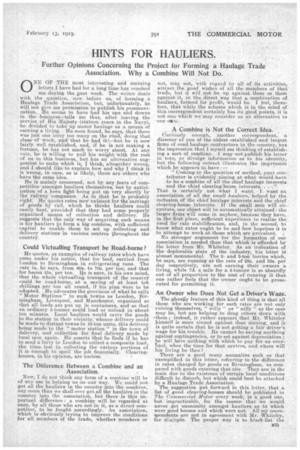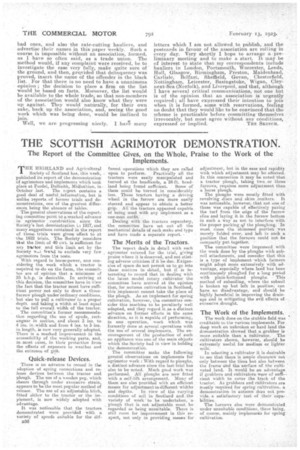HINTS FOR HAULIERS.
Page 21

Page 22

If you've noticed an error in this article please click here to report it so we can fix it.
Further Opinions Concerning the Project for Forming a Haulage Trade Association. Why a Combine Will Not Do.
ONE OF THE most interesting and amusing letters I have had for a long time has reached . me during the past week. The writer deals with the question, now before us, of forming a Haulage Trade Association, but, unfortunately, he will not give me permission to publish his pinmunication. He seems to have had his ups and downs in the business—tells me that, after leaving the service of His Majesty (sixteen years in the Navy), he decided to take up motor haulage as a means of earning a living. He soon found, he says, that there was just one lorry too many on the rbad, doing that class of work, and that he had it!—but he is now fairly, well established, and, if he is not making a fortune, he has not much to worry about. At any rate, he is willing to pull his weightwith the rest of us, in this business, but has an alternative sug
i
gesti6n to make which s, I think, altogether wrong, and -r should like to explain how and why I •think it is wrong, in case, as is likely, there are others who have the same idea.
He is mainly concerned, not by any fears of competition amongst hauliers themselves, but by anticipation of a keen fight being put up very shortly by the railway' companies. As to that he is probably right. He quotes rates now existent for the carriage of goods by rail, which he thinks hauliers colird easily heat, provided that they had some properly organized means of collection and delivery. He suggests that the only way of acquiring such means, is for hauliers to form a big combine, with sufficient capital to enable them to set up collecting and delivery stations in various centres throughout the -country.
Could Victualling Transport beRoad-borne ?
He quotes, as examples of railway rates which have come under his notice, that for beef, carried from London to Birmingham in refrigerating vans. The rate is he says, from 60s. to 70s. per ton, and that for bacon 45s. per ton. Ile is sure, in his own mind, that the whole victualling transport of the country could be road-borne, at a saving of at least teri shillings per ton all round, if his plan were to be adopted. He advocates the provision of what be calls " Motor Stations" in such towns as London, Birmingham. Liverpool, and Manchester, organized so that all loads are put up in containers, and so that an ordinary 5-tonner could load or unload in about
ten minutes. Local hauliers would carry the goods , to the station in their vicinity, whence delivery could , be made to distant towns in 10-ton units, this delivery being made to the " motor station " in the town of delivery, and collection for final delivery made by local men again. He asserts that he finds if he has to send a lorry to London to collect a composite load, the time lost in collecting the various portions of it is enough to spoil the job financially. Clearing houses, in his opinion, are useless. i
The Difference Between a Combine and an Association.
Now, I do not think any form of a combine will be of any use in helping us onour way. We could not get all the hauliers in the country into the combine, any moro than we shall ever get all the hauliArs in the country into the association, but there is this important difference: a combine will be regarded at once, by all those who are not in it, as a direct competitor, to be fought accordingly. An association, which is obviously trying to improve the conditions for all members of the trade, whether members or not, may not, with regard to all of its .activities, attract the good wishes of all the members of that trade, but it will not be up against them or them against Az in the direct way that a combination of hauliers, tormed for profit, would be. I feel, therefore, that while the scheme which is in the mind of this correspondent certainly has its good points, it is not one which we may co.nsider as an alternative to OUT cif n.
A Combine is Not the Correct Idea.
Curiously enough, another correspondent, a director of one of the oldest established and largest firms of road haulage contractors in the country, has the impression that I myself am thinking of establishing a sort of combine. I may not publish his letter in tote, or divulge information as to his identity, but the following extract illustrates the impression
which he appears to have •
" Coming.to the question of method, your contributor is evidently aiming at what would have to be a combine of all the chief haulage interest and the chief clearing-house -interests. .• ,.." • That is certainly not what I want. I want art association of all the small hauliers, helpedby the inclusion of the chief haulage interests and the chief clearing-house interests. If the small men will cO-. operate, our object will be automatically attained : the larger firms will come in anyhow, because they have, in the first place, sufficient experience to realize the need for rate stabilification, and, in the second, to know what rates ought to be and how hopeless it is to attempt to work at those which are prevalent. , No stronger argument -for the formation of our association is needed than that which is afforded by the letter from Mr. Whiteley. As an indication of the deplorable state of the industry, his letter almost monumental. The 2and 3-ton lorries which, he says, are running at the rate of 28s. and 3.1s. per day respectively, are not earning their owners a living, while 7d. a mile for a 4-tonner is so absurdly out of all proportion to the coat of running it that one rather feels that the owner ought to be prosecuted for permitting it.
An Owner who Does Not Get a Driver's Wage.
The ghastly feature of this kind of thing is that all those who are working for such rates are not only -ruining themselves, " willy " or " nilly " as the ease may bet but are helping to drag others down with -them • indeed, it rather appears that Mr. Whiteley himself is more sinned against than sinning, and it is quite certain that he is not getting a fair driver's wage for his trouble. He cannot be saying anything against contingencies, or to set against depreciation; he will have nothing with which to pay for an overhaul, when the time for that arrives, and where will his living be then?
There are a good many anomalies such as that exemplified in this letter, referring to the difference in rates charged fer goods ex Birmingham, as compared with goods entering that city. They are in the main due to the existence of certain local conditions difficult to disturb, but which could best be attacked by a. Haulage Trade Association.
The suggestion put forward in this letter, that a fist of good clearing-houses should be published in The Commercial Motor every week, is a good one, but impracticable, for the reason that we would never get unanimityamongst hauliers as to which were good houses and which were not. All my correspondents are not in agreement with Mr. Whiteley, for 6:a'aiple. The proper way is to black-list the bad ones,. and also the rate-cutting hauliers, and advertise their names in this paper weekly. Such a course is impossible without an association, formed, as . I have so often said, as a trade union. The method would, if any complaint were received, be to investigate the case very fully, make quite sure of the ground, and then, prqvided that delinquency was proved, insert the name of the offender in the black list. For that there is DO need to have a unanimous .opinion; the decision to place a firm on the list would be based on facts. Moreover, the list would be available to the whole trade, so that non-members of the association would also know what they were up against. They would naturally, for then. own sake, back up the association, and, seeing the good work which was being done, would be inclined to
join: Well, we are progressing nicely. I have many letters which I am not allovlred to publish, and the postcards in favour of the association are rolling in every day. Very shortly I hope to arrange a preliminary meeting and to make a start. It may be of interest to State that my correspondents include hauliers in London, Portsmouth, Worcester, Leeds, Hull, Glasgow, Birmingham, Preston, Maidenh.ead, Carlisle, Belfast, Sheffield, Govan, Chesterfield, Nottinghani, Leicester, Basingstoke, Wigan, Cleynext-Sea (Norfolk), and Liverpool, and that, although I have several critical communications, not one but is of the opinion that an association is urgently required ; all have expressed their intention to join when it is formed, some with reservations, feeling no doubt that they would like to be convinced that the scheme is practicable before committing •themselves irrevocably, but most agree without any cOnditions,
expressed or implied. THE SKOTCH.
































